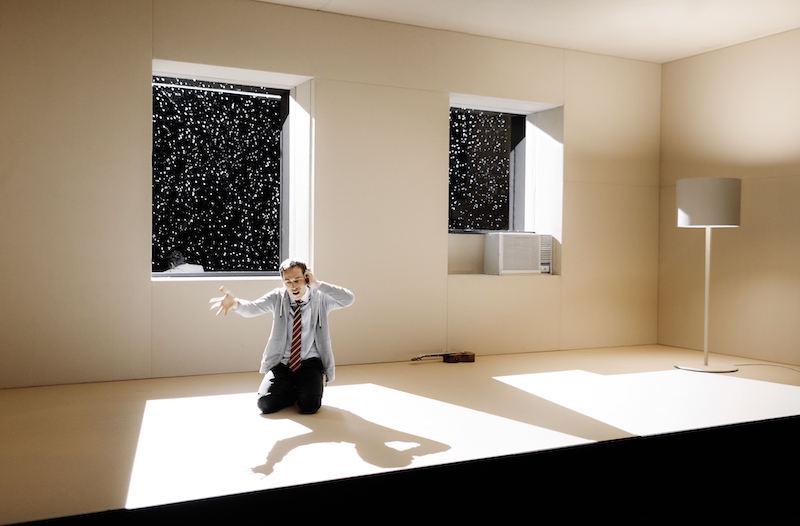Song from Far Away, Young Vic | reviews, news & interviews
Song from Far Away, Young Vic
Song from Far Away, Young Vic
Simon Stephens’ raw meditation on grief creeps under the skin

“My brother died.” That’s the reality New York-based banker Willem struggles to inhabit when he returns to his estranged family in Amsterdam. There is no sense in Pauli’s loss – a sudden heart attack at 20, cradled by a stranger in the street – nor finality. Willem’s response is to continue the conversation through an elegiac series of letters, countering the abandonment and searching for meaning in both a life interrupted and his own isolated existence.
Protean Simon Stephens, in his first original play for the Young Vic, delivers a penetrating 75-minute monologue. Its stark potency is superbly served by Ivo van Hove’s Toneelgroep Amsterdam production, theatre stripped bare as a mesmerising Eelco Smits (pictured below) strips off his clothes. Jan Versweyveld supplies barren white walls and windows that look out over a darkened, wintry city, but also conjure a ghostly reflection. Sometimes the meticulous lighting dims so much that Smits is in silhouette, every gesture magnified. Nothing stands between the audience and total emotional exposure.
Grief is not ennobled, and though seismic, the shock waves ripple through the ordinary. Willem mordantly and matter-of-factly charts everything, from minor annoyances to harrowing encounters. The call from his mother “comes crashing in” – Smits mimes the fatal descent of a plane – but it’s an inconvenient time, and he’s short with her. His obsessively tidy sister views oddly dispassionate Willem as a threat to her ordered universe. She’s looking after their parents, she chides – why isn’t he playing his part? In this reversal of caregiving roles, Willem helplessly observes his father’s primal rage and grief. Smits surrenders to it in an unforgettable animalistic howl. Willem’s homecoming is complicated further by his dislocation, which we share as he lists alien landmarks in an unfamiliar language. He’s most comfortable in the Lloyd hotel, which once housed emigrants heading to the New World, and the anonymous, liminal airport lounge. Then, in his local gay bar, he hears a song that succeeds where speech has failed: an exquisitely soulful Mark Eitzel piece that haunts Stephens’ poetic text. Willem’s attempts to recreate it speak to the impossibility of capturing the intangible – maddening for someone who feeds off control.
Willem’s homecoming is complicated further by his dislocation, which we share as he lists alien landmarks in an unfamiliar language. He’s most comfortable in the Lloyd hotel, which once housed emigrants heading to the New World, and the anonymous, liminal airport lounge. Then, in his local gay bar, he hears a song that succeeds where speech has failed: an exquisitely soulful Mark Eitzel piece that haunts Stephens’ poetic text. Willem’s attempts to recreate it speak to the impossibility of capturing the intangible – maddening for someone who feeds off control.
Smits evokes a vivid cast of supporting characters: the wheeler-dealer uncle trying to shift dodgy Persian rugs; pivotal old flame Isaac; and a one-night stand absurdly pontificating in a way Willem knows his brother would have found amusing. Pauli is the most vivid summoning of all, from niece Anka spelling out his name with a sparkler to childhood memories and Willem kneeling to address a chair. He is both there and not there, for us as well as for Willem.
This is a subtle piece of shattering accumulative power. It demands such attentiveness that when an onstage AC unit ceases humming, the impact is like a gunshot. “We exist in the gaps between the sounds we make,” posits Willem, and the desolate silence becomes worthy of a life.
more Theatre
 Banging Denmark, Finborough Theatre review - lively but confusing comedy of modern manners
Superb cast deliver Van Badham's anti-incel barbs and feminist wit with gusto
Banging Denmark, Finborough Theatre review - lively but confusing comedy of modern manners
Superb cast deliver Van Badham's anti-incel barbs and feminist wit with gusto
 London Tide, National Theatre review - haunting moody river blues
New play-with-songs version of Dickens’s 'Our Mutual Friend' is a panoramic Victori-noir
London Tide, National Theatre review - haunting moody river blues
New play-with-songs version of Dickens’s 'Our Mutual Friend' is a panoramic Victori-noir
 Machinal, The Old Vic review - note-perfect pity and terror
Sophie Treadwell's 1928 hard hitter gets full musical and choreographic treatment
Machinal, The Old Vic review - note-perfect pity and terror
Sophie Treadwell's 1928 hard hitter gets full musical and choreographic treatment
 An Actor Convalescing in Devon, Hampstead Theatre review - old school actor tells old school stories
Fact emerges skilfully repackaged as fiction in an affecting solo show by Richard Nelson
An Actor Convalescing in Devon, Hampstead Theatre review - old school actor tells old school stories
Fact emerges skilfully repackaged as fiction in an affecting solo show by Richard Nelson
 The Comeuppance, Almeida Theatre review - remembering high-school high jinks
Latest from American penman Branden Jacobs-Jenkins is less than the sum of its parts
The Comeuppance, Almeida Theatre review - remembering high-school high jinks
Latest from American penman Branden Jacobs-Jenkins is less than the sum of its parts
 Richard, My Richard, Theatre Royal Bury St Edmund's review - too much history, not enough drama
Philippa Gregory’s first play tries to exonerate Richard III, with mixed results
Richard, My Richard, Theatre Royal Bury St Edmund's review - too much history, not enough drama
Philippa Gregory’s first play tries to exonerate Richard III, with mixed results
 Player Kings, Noel Coward Theatre review - inventive showcase for a peerless theatrical knight
Ian McKellen's Falstaff thrives in Robert Icke's entertaining remix of the Henry IV plays
Player Kings, Noel Coward Theatre review - inventive showcase for a peerless theatrical knight
Ian McKellen's Falstaff thrives in Robert Icke's entertaining remix of the Henry IV plays
 Cassie and the Lights, Southwark Playhouse review - powerful, affecting, beautifully acted tale of three sisters in care
Heart-rending chronicle of difficult, damaged lives that refuses to provide glib answers
Cassie and the Lights, Southwark Playhouse review - powerful, affecting, beautifully acted tale of three sisters in care
Heart-rending chronicle of difficult, damaged lives that refuses to provide glib answers
 Gunter, Royal Court review - jolly tale of witchcraft and misogyny
A five-women team spell out a feminist message with humour and strong singing
Gunter, Royal Court review - jolly tale of witchcraft and misogyny
A five-women team spell out a feminist message with humour and strong singing
 First Person: actor Paul Jesson on survival, strength, and the healing potential of art
Olivier Award-winner explains how Richard Nelson came to write a solo play for him
First Person: actor Paul Jesson on survival, strength, and the healing potential of art
Olivier Award-winner explains how Richard Nelson came to write a solo play for him
 Underdog: the Other, Other Brontë, National Theatre review - enjoyably comic if caricatured sibling rivalry
Gemma Whelan discovers a mean streak under Charlotte's respectable bonnet
Underdog: the Other, Other Brontë, National Theatre review - enjoyably comic if caricatured sibling rivalry
Gemma Whelan discovers a mean streak under Charlotte's respectable bonnet
 Long Day's Journey Into Night, Wyndham's Theatre review - O'Neill masterwork is once again driven by its Mary
Patricia Clarkson powers the latest iteration of this great, grievous American drama
Long Day's Journey Into Night, Wyndham's Theatre review - O'Neill masterwork is once again driven by its Mary
Patricia Clarkson powers the latest iteration of this great, grievous American drama

Add comment